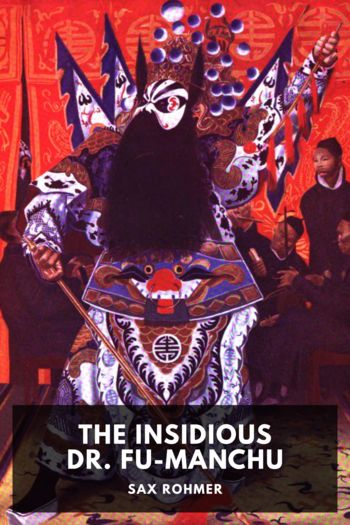The Insidious Dr. Fu-Manchu - Sax Rohmer (best finance books of all time .TXT) 📗

- Author: Sax Rohmer
Book online «The Insidious Dr. Fu-Manchu - Sax Rohmer (best finance books of all time .TXT) 📗». Author Sax Rohmer
It began to laugh—peal after peal—hideous and shrill.
Nothing so terrifying had ever smote upon my ears. I was palsied by the horror of the sound.
Then Nayland Smith pressed the button of an electric torch which he carried. He directed the disk of white light fully upon the face in the doorway.
“Oh, God!” cried Weymouth. “It’s John!”—and again and again: “Oh, God! Oh, God!”
Perhaps for the first time in my life I really believed (nay, I could not doubt) that a thing of another world stood before me. I am ashamed to confess the extent of the horror that came upon me. James Weymouth raised his hands, as if to thrust away from him that awful thing in the door. He was babbling—prayers, I think, but wholly incoherent.
“Hold him, Petrie!”
Smith’s voice was low. (When we were past thought or intelligent action, he, dominant and cool, with that forced calm for which, a crisis over, he always paid so dearly, was thinking of the woman who slept above.)
He leaped forward; and in the instant that he grappled with the one who had knocked I knew the visitant for a man of flesh and blood—a man who shrieked and fought like a savage animal, foamed at the mouth and gnashed his teeth in horrid frenzy; knew him for a madman—knew him for the victim of Fu-Manchu—not dead, but living—for Inspector Weymouth—a maniac!
In a flash I realized all this and sprang to Smith’s assistance. There was a sound of racing footsteps and the men who had been watching outside came running into the porch. A third was with them; and the five of us (for Weymouth’s brother had not yet grasped the fact that a man and not a spirit shrieked and howled in our midst) clung to the infuriated madman, yet barely held our own with him.
“The syringe, Petrie!” gasped Smith. “Quick! You must manage to make an injection!”
I extricated myself and raced into the cottage for my bag. A hypodermic syringe ready charged I had brought with me at Smith’s request. Even in that thrilling moment I could find time to admire the wonderful foresight of my friend, who had divined what would befall—isolated the strange, pitiful truth from the chaotic circumstances which saw us at Maple Cottage that night.
Let me not enlarge upon the end of the awful struggle. At one time I despaired (we all despaired) of quieting the poor, demented creature. But at last it was done; and the gaunt, bloodstained savage whom we had known as Detective-Inspector Weymouth lay passive upon the couch in his own sitting-room. A great wonder possessed my mind for the genius of the uncanny being who with the scratch of a needle had made a brave and kindly man into this unclean, brutish thing.
Nayland Smith, gaunt and wild-eyed, and trembling yet with his tremendous exertions, turned to the man whom I knew to be the messenger from Scotland Yard.
“Well?” he rapped.
“He is arrested, sir,” the detective reported. “They have kept him at his chambers as you ordered.”
“Has she slept through it?” said Smith to me. (I had just returned from a visit to the room above.) I nodded.
“Is he safe for an hour or two?”—indicating the figure on the couch. “For eight or ten,” I replied grimly.
“Come, then. Our night’s labors are not nearly complete.”
XXXLater was forthcoming evidence to show that poor Weymouth had lived a wild life, in hiding among the thick bushes of the tract of land which lay between the village and the suburb on the neighboring hill. Literally, he had returned to primitive savagery and some of his food had been that of the lower animals, though he had not scrupled to steal, as we learned when his lair was discovered.
He had hidden himself cunningly; but witnesses appeared who had seen him, in the dusk, and fled from him. They never learned that the object of their fear was Inspector John Weymouth. How, having escaped death in the Thames, he had crossed London unobserved, we never knew; but his trick of knocking upon his own door at half-past two each morning (a sort of dawning of sanity mysteriously linked with old custom) will be a familiar class of symptom to all students of alienation.
I revert to the night when Smith solved the mystery of the knocking.
In a car which he had in waiting at the end of the village we sped through the deserted streets to New Inn Court. I, who had followed Nayland Smith through the failures and successes of his mission, knew that tonight he had surpassed himself; had justified the confidence placed in him by the highest authorities.
We were admitted to an untidy room—that of a student, a traveler and a crank—by a plain-clothes officer. Amid picturesque and disordered fragments of a hundred ages, in a great carven chair placed before a towering statue of the Buddha, sat a handcuffed man. His white hair and beard were patriarchal; his pose had great dignity. But his expression was entirely masked by the smoked glasses which he wore.
Two other detectives were guarding the prisoner.
“We arrested Professor Jenner Monde as he came in, sir,” reported the man who had opened the door. “He has made no statement. I hope there isn’t a mistake.”
“I hope not,” rapped Smith.
He strode across the room. He was consumed by a fever of excitement. Almost savagely, he tore away the beard, tore off the snowy wig dashed the smoked glasses upon the floor.
A great, high brow was revealed, and green, malignant eyes, which fixed themselves upon him with an expression I never can forget.
It was Dr. Fu-Manchu!
One intense moment of silence ensued—of silence which seemed to throb. Then:
“What have you done with Professor Monde?” demanded Smith.
Dr. Fu-Manchu showed his even, yellow teeth in the singularly evil smile which I knew so well. A manacled prisoner he sat as unruffled as





Comments (0)